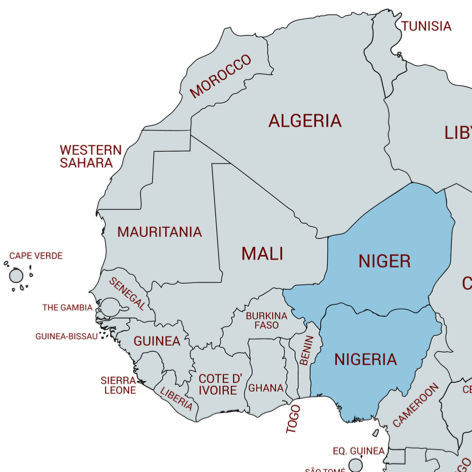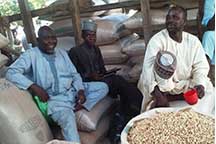FINAL REPORT: Baseline Value Chain Assessment for Key Legume Markets in West Africa
All activity under this project has concluded. The project’s final project report is provided here.
Principal investigator/Lead institution: Dr. Michael Olabisi, Michigan State University
Collaborating institutions: University of Ilorin, Bayero University, Nigeria
Université Abdou Moumouni de Niamey, Niger
Works in: Niger, Nigeria

Policymakers need information on how value chains function, and what makes them resilient. The absence of information on which markets are linked to which farms, and how intermediaries connect farms to markets, creates a real challenge: Policy makers are forced to design farm-to-market interventions in the absence of a map of the value-chain linkages that they are trying to improve.
To address this gap, in the hope of supporting initiatives for resilient legume value chains in the arid regions of West Africa, we plan targeted surveys for three large cities in or near the West African Sahel -- Kano and Ilorin in Nigeria, and Niamey in Niger. These markets are important trade hubs connecting producers and consumers in this region.
Kano is the largest city in the West and Central African Sahel; Ilorin is a major link point between agricultural producers of Northern Nigeria and the agricultural markets of Lagos -- Africa’s largest city, while Niamey is arguably the most centrally located West African city, a potential hub for connecting the Sahelian population centers of Sokoto and Kano, in Nigeria, Zinder and Maradi in Niger, as well as Ouagadougou in Burkina Faso. Mapping the value chains in these cities can guide future efforts to make sure food gets to markets and reaches the consumers.

The surveys will document key actors along the value chains -- their locations, genders, ages, and the scale of their businesses. We will also document the buyer-supplier linkages step-by-step from farmers to consumers for these legume markets. The surveys will assess the functioning and resilience of the value chains, knowing that resilient value chains are critical for farmers to generate income and earn livelihoods, and for consumers to access food and other agricultural products.
The information generated by the survey has great potential for mitigating the effects of events that may disrupt the flow of food from producers to final consumers. The proposed baseline assessment will also enable policymakers to identify gaps in market linkages -- flows of food from producers to consumers that could help producers and consumers, but that do not currently exist.
All activity under this project has concluded. The project’s final project report is provided here.